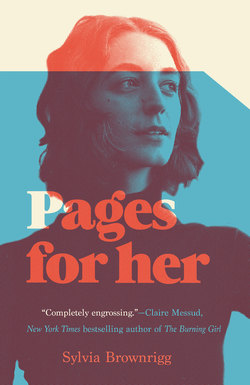Читать книгу Pages For Her - Sylvia Brownrigg - Страница 15
На сайте Литреса книга снята с продажи.
7
ОглавлениеThis affair was not, if you had been reading Flannery’s life closely, a complete surprise.
As she had recognized in the early days of her adulthood, not long before she introduced Adele to her dear, puzzled mother (who did not want to be negative, she just wanted to understand), Flannery had known attractions to men as well as to women. Flannery had gone to bed with a few, even. The tall and rangy contractor guy. That notorious poet. Ill-advisedly, her publicist on the paperback of Don Lennart. She could be drawn to men; she had just never been drawn in by a man.
Charles Marshall drew Flannery into him, and he did not let go. He almost smothered her, with his size and his personality and his disproportionate gifts. He showered her with offerings, flowers and jewelry and clothing and, even more persuasively for Flannery, small Charles Marshall originals: a tiny ingenious bicycle built of beat-up ballpoint pen casings and two old typewriter ribbon wheels, with a banner that said love story across its handlebars; a headband of interwoven shot silk and oxidized silver with a card attached that said to my Beauty.
Strangely, Flannery found that she did not mind being smothered, and she did not object to the inundation of splendid gifts. (‘The guy’s a genius,’ said Susan Kim, somewhat awed. ‘I may have to steal some of his designs for my boss.’) After the artificial public self Flannery had had to create for the promotion of her memoir, it was a relief to disappear into the encompassing embrace of Charles Marshall. (‘Charles Marshall, honey?’ her mother said, when Flannery eventually confided in her. ‘The Charles Marshall?’) Truly grateful, Flannery reciprocated in the way she was best able to at that time: she gave up every inch of her lithe body to him, handing over to Charles all the pleasure he had the hunger and the energy to take.
The lust between them was intense and mutual and all but unquenchable, for a time. Charles was the opposite of all that Flannery had wanted before and perhaps that mirrored inversion generated some of the heat of the attraction, like a magnifying glass focusing solar rays. The man was large, a heavy breather, a snorer, a guffawer. Previously Flannery had loved the petite, the tactful and the elegant – her first great love having embodied those qualities most purely – though anyone Flannery loved had also to have a straight spine, and a strong nerve. When Charles and Flannery made love, the man announced himself like an important guest at a party when on the threshold of climax, and Flannery came to relish those announcements.
There was conversational texture between them, too, their talk a colorful thread along which were strung bright beaded nights of sex. It was when Charles started to share stories of his early New York years, before his success, his scrappy early marriage long before the heiress (‘my very first wife,’ he called the New Yorker jokingly; ‘we were kids, we were pups, we scratched and bit each other because we didn’t know any better’) that Flannery started to feel the shape of the man beside her, and a tenderness toward him surfaced, which only enhanced her attraction. Flannery noticed, with the surprise you have at finding a new wrinkle or mole on your body, the desire within herself to protect the great Charles Marshall. How crazy was that? That she, Flannery Jansen, author of one hit book and one not, believed she might somehow tend to this famous man who commanded steel and aluminum, men and machines, art critics and dealers? That she did, as a matter of fact, want that job?
People experiment in romance in so many ways. They need to leave themselves behind, or complement themselves, finding substance in the areas where they feel empty. They risk similarity, or difference. They find their twin, or their opposite. They seek loves of different ages or creeds, nationality or skin hue, to rub up against the expectations of their family or culture or simply to create roughness and traction in their own interior. Montagues want Capulets, Janes their Rochesters. Flannery Jansen might once have made sweaty, urgent love under a saguaro cactus with a willowy Nordic girl named Adele, who was frequently mistaken for her sister, but at thirty she was in a rolling, rollicking affair with the heavy, hearty artist Charles Marshall.
Opposites attract? Yes, Charles was Flannery’s opposite. A man with arresting charms and pungent faults, loud virtues and quiet failings, just like anyone else; but also, point by point, a person like a study in everything Flannery, in her native self, preferred not to be. On she went, though, taking and acing it, the Charles Marshall course. Swallowing new knowledge. Earning an A.
